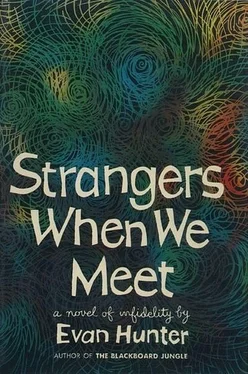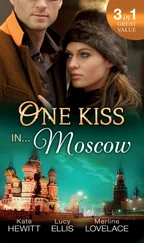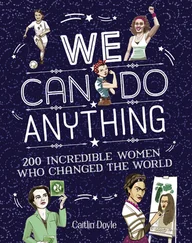And then, with his death, all joy seemed to go out of the teardrop-shaped earrings. She wrapped them carefully and put them away. They had been pressed into her hand by the man she called “Papa,” and now Papa was dead, and suddenly the earrings had gone lifeless and she’d had no desire to wear them ever.
She wore them in January.
She wore black slacks, and a black sweater, and a short red car coat, the collar high against her cheek. And she wore the topaz earrings, and she hustled Patrick out of the house twenty minutes before the bus was scheduled to arrive. The weekend had been a very long one, and she looked forward to seeing Larry this morning, and she wanted to look very pretty. She told herself she was behaving like a silly adolescent girl, but nonetheless she hurried to the bus stop, and she was annoyed because she could not see his house, from there.
“It’s cold, Mummy,” Patrick said.
“Yes,” she answered absently.
“Why’d we have to come so early?”
“The fresh air will do us good,” she said.
“Mum?”
“Yes?”
“Do you love me?”
Startled, she looked down at her son. “Why...” It had never occurred to her that he wondered such things. She stared at him in slow understanding. “I love you very much, sweetheart,” she said.
Patrick nodded. His hair was a pale wispy blond, the color of his mother’s, but lacking the rich texture of her hair. His eyes were wide and brown, his mother’s exactly, large now in a pale face as he stared up at her.
“Do you love Daddy?”
“Of course I love Daddy,” she said.
“Very much?”
“Yes.” She turned her eyes from his, embarrassed by their scrutiny. “Yes, very much.”
“Honest?” he said.
“Yes, of course. Why?”
“Does he think you’re pretty?”
“I suppose so.”
“Doesn’t he?”
“Why don’t you ask him , Patrick?”
“I did.”
His answer startled her. She looked at him again, feeling almost as if she were standing in the cold with a little stranger who asked personal questions and gave startling answers.
“What... what did Daddy say?” she asked.
“He said I was too young to be asking such things.”
“What things?”
“I don’t know,” Patrick said, puzzled.
“Well, he meant...” She paused, wondering what he had meant. Too young to ask what things? To ask if a man thought his wife pretty? What kind of nonsense...? “He meant... that... that a boy should always think his Mummy is pretty. That’s what he meant, Patrick.”
“But I do think you’re pretty.”
She hugged him to her and said, “I think you’re pretty too.”
“Pretty is for girls,” Patrick said. “I’m handsome. That’s what my honey tells me.”
“Your honey?” Margaret said.
“Sure, Lucy. Lucy Hager. She’s in my class. She’s my honey.”
“I didn’t know that,” Margaret said.
“Sure, everybody knows it. All the kids in the class. I chase her all around.”
“You do?” Margaret said, stifling a laugh.
“You should see the way I clobber her. She loves it. That’s ’cause she’s my honey.”
“I see.”
“She’s kind of pretty. But not so pretty as you,” he said quickly.
“What does she look like?”
“I don’t know. She’s got pigtails. Is that what you call them? Where the hair is... you know...” He indicated braids with his hands.
“Yes, pigtails.”
“That’s what she’s got. Her mother is pregnant.”
“How do you know?”
“She told me. Lucy, you know. She said her father gave her mother a seed. It’s in her mother’s belly now. You should see her mother. She’s fat as a horse.”
Margaret burst out laughing.
“Well, what’s so funny about that?” Patrick asked.
“Nothing, nothing. I—”
“There’s Chris!” Patrick shouted.
She felt her heart quicken instantly. Purposely, she did not turn because she didn’t want to seem too anxious to see him. She could hear Patrick shouting, could hear the answering shouts of Larry’s son as the boys ran to join each other. And then, slowly, she turned, wanting to see the expression on his face when he first saw her.
The woman had black hair.
The hair was caught at the nape of her neck with a bright blue ribbon, and even from this distance her eyes were lovely, a clear sky blue. As she came closer, Margaret saw that the woman had a good nose, and a full mouth, and that she walked with certainty, her head erect, her shoulders back. And even though she wore faded dungarees and a heavy sweatshirt with the words PRATT INSTITUTE on it, Margaret could see that the woman’s figure was trim and curved, and that her breasts beneath the shapeless garment were firm.
The woman was smiling. She walked directly to Margaret, extended her hand and said, “You couldn’t be anyone but Margaret Gault. How do you do? I’m Eve Cole.”
He held her to him, and he thought of the reality of her, amazed that he could be loved by her. In his eyes, she had miraculously become more than a woman, more than mere flesh and blood. He did not like to think of her as a symbol, but he was a symbol manipulator by trade — except during the exciting time when symbols became realities, when inked lines became walls, when pencil sketches became cypress panels and native stone — and in his mind she became Woman. Not this woman but every woman he had ever known or would want to know.
In the motel room, he clung to her, completely relaxed except for the urgent pressure of wanting her. He did not want her because she was close at last after a week of waiting; but he knew the ritual, knew he would have to release her to truly possess her, to undam the terrible urgent longing inside. She had kept him perched on the narrow edge of desire on the drive to the motel. She had caressed him and whispered to him gently, and then turned away from him to light a cigarette or change the station on the radio. And then she had returned to him, and her hands were gentle again and then fiercely demanding, and then again she left him, and his fingers trembled on the wheel.
Here at last, here alone at last, he released her gently. He helped her off with her coat, and she picked up her purse and then went into the bathroom, closing but not locking the door. He could hear the sink water running as he put the coin into the pay-radio and fiddled with the dial. He moved with complete familiarity in the small cabin. The room was furnished with absolute indifference to taste or lack of taste, concerning itself solely with essentials. The room was as basic as their need for each other. And in the room, the person who was Larry Cole did not think of interior decoration. The surroundings of the room, the furniture, the insipid paintings on the walls, were as meaningless as the furniture of life and of absolutely no importance to what he shared with Maggie.
How had he lived without her? he wondered. How had he possibly lived before this face had come to him, before this warm rich body had been delivered to him, before this wonderful creature, this marvelously live creature, had come to him to keen of love and life, had come to him with her promise of faraway places, had come to him with a gentle mouth and fierce hands to keen to him a song he once had known, a song that lingered half-remembered in the dim passages of his memory?
He took off his jacket and hung it in the closet, and then he pulled down his tie and placed the tie clasp on the dresser top together with his wallet, his car keys, his cigarettes and his loose change. Humming to the radio, he took off his shirt and his tee shirt, and then his shoes and socks. He walked about the cabin bare-chested and barefooted, pulling down the yellow chenille bedspread, pulling back the blankets, lighting a cigarette, which he would put out the moment she came to him.
Читать дальше












